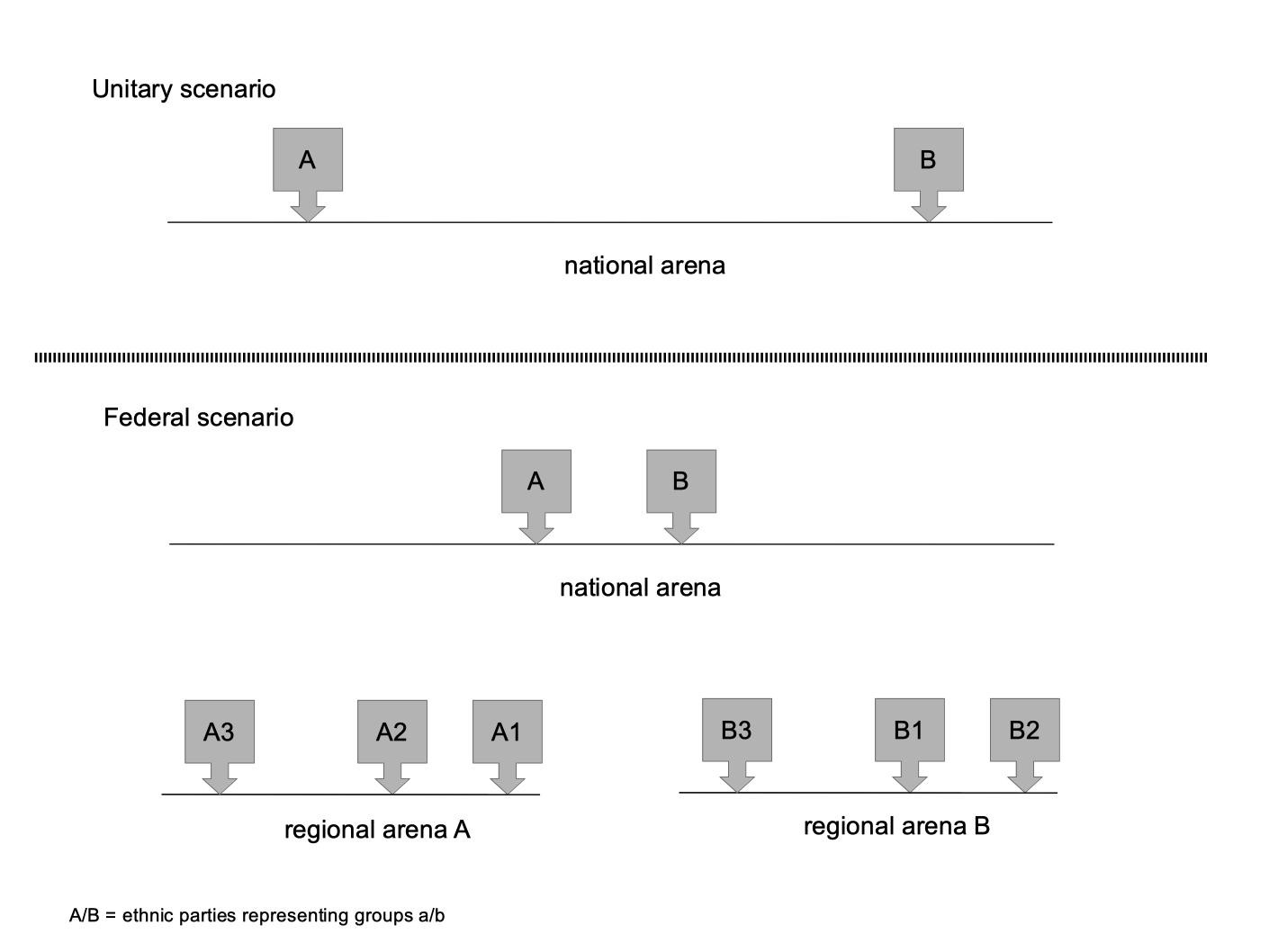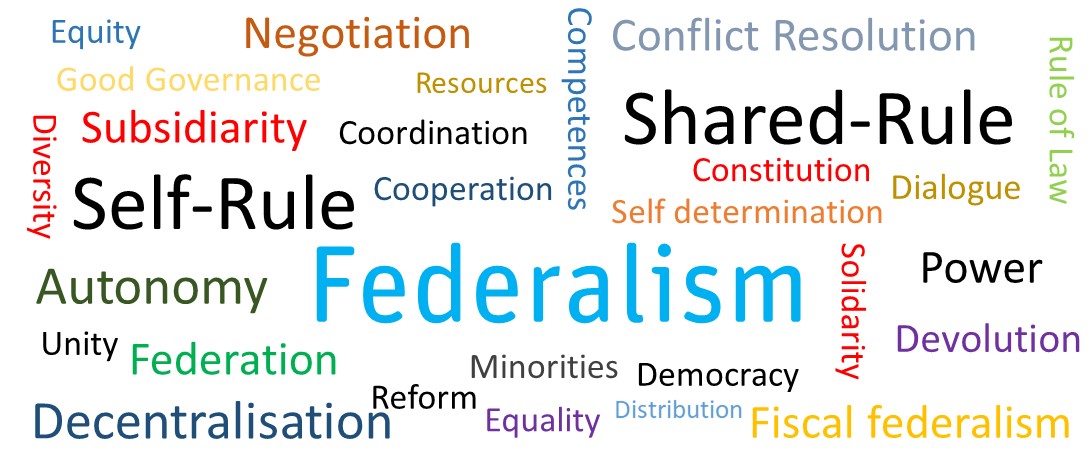Abstract
‘Ethnic outbidding’ captures a type of electoral competition in which parties that champion the interests of ethnic groups contest each other by adopting ever more radical positions on ethnic issues. Yet, despite the fact that many of the world’s plural societies have both, significant ethnic parties and federal institutions, we do not yet know how federalism affects the likelihood of ethnic outbidding. This contribution develops some theoretical expectations about the relationship between federalism and ethnic outbidding, and discusses what kind of evidence we would need in order to test whether they hold true.
Introduction
Is federalism conducive to ethnic outbidding? This contribution explains why we do not have a clear answer to this question, develops some theoretical expectations, and discusses what kind of evidence we would need in order to test whether they hold true. Two literatures are pertinent to the discussion: The literature on ethnic outbidding analyses under which conditions ethnic parties contest their opponents by adopting ever more radical positions. The literature on the paradox of federalism assesses whether federalism is a viable alternative to, or a slippery slope towards secession. While the outbidding literature tends to neglect institutional incentives (aside from those of the electoral system), the paradox of federalism puts the spotlight on the simultaneous radicalization- and moderation-incentives of federal institutions, but tends to treat “regions” or “ethnic groups” as unified actors, neglecting the logic of party competition. Given their complementarity, it would be natural to combine the literatures. However, so far, there is little exchange (Inman 2013 being a rare exception). After briefly introducing the two literatures, I therefore develop a set of brief expectations about how federalism might influence ethnic parties’ strategic choices in competition, and close this piece by making suggestions for how these could be tested empirically.
Ethnic Outbidding: Parties without Federal Institutions
The theory of ethnic outbidding analyses under which conditions parties that champion the interests of a particular ethnic group choose to outbid their opponents by adopting ever more radical positions on an ethnic dimension of competition. The theory originates with Rabushka and Shepsle’s (1972) model of democratic competition in plural societies. It is based on the assumption of intransigent group preferences: “Community A prefers alternative a, then community B not only prefers alternative b, but also believes that b implies not a “(ibid.: 467). Under this (rather extreme) assumption, once ethnicity becomes salient, parties with more radical positions will win over moderates involved in multi-ethnic coalitions (for a similar take on ethnic competition, see Horowitz 1985: part 3).
Subsequent contributions have challenged this theory. They have shown that ethnic parties have more strategies than radical outbidding at their disposal. Some ethnic parties choose to de-ethnicize their appeal over time (Sanjaume-Calvet & Riera-Gil 2020) or to combine ethnic identity markers in novel ways to reach beyond their original group, in particular if electoral institutions are permissive (Chandra 2005). Others deliberately adopt more moderate stances on ethnic issues to appeal to voters of the middle ground (Coakley 2008), or position themselves on an ethnically cross-cutting dimension of political competition, in particular if challenged by non-ethnic parties (Zuber 2012). Ethnic parties also sometimes choose to cooperate with other parties appealing to the same group (Stewart 2019; Stroschein 2011), or with ideologically proximate parties of other groups (Szöcsik 2012: chapter 5). However, while these contributions have refined our understanding of ethnic party behaviour in competition, they have tended to neglect the incentives of a federal, as opposed to a unitary system of government.
The Paradox of Federalism: Institutions without Parties
The literature on federalism and secessionist conflict does theorize the institutional incentives federalism offers for regional elites, but neglects the logic of ethnic party competition. The paradox of federalism holds that while regional self-government can prevent secession by raising the benefits of remaining within the common state for regionally concentrated minorities, setting up and strengthening regional institutions of self-government that in turn strengthen regional identities may itself make secessionism more likely in the medium run (Erk & Anderson 2009; Kymlicka 1998). However, so far, in case scholars disaggregated their analysis of federalism or decentralization and secessionism to the behavior of individual parties, they focused on parties’ electoral success rather than their positions (e.g. Brancati 2006); studied regionalist, rather than ethnic parties (e.g. Massetti & Schakel 2016), or analyzed the relationship between self-rule and ethnic competition at the national level, while neglecting regional arenas of competition (e.g. Szöcsik & Zuber 2021).
Federalism and Ethnic Party Behaviour: Theoretical Expectations
What happens to the logic of ethnic party competition once we move from a unitary to a federal setting? Most importantly, federalism adds regional arenas of competition (cf. figure 1). Shifting decision-making competencies concerning inter-ethnically conflictive issues to the regional level can pacify the national arena, the arena the ethnic outbidding model is primarily concerned with. We should therefore observe less inter-ethnic polarization and conflict among parties representing different ethnic groups at the national level.
However, a regional arena where a national minority is now the local majority will likely be subject to more intense intra-ethnic competition (Brancati 2006; Inman 2013, see lower part of figure 1). First, whereas ethnic parties had incentives to cooperate in order to achieve representation for their group in the national parliament, group representation is guaranteed within the minority region. Ethnic parties can therefore contest each other without jeopardizing group representation. Second, having competencies means parties compete about how these competencies should be filled with content. Since non-ethnic preferences about social or economic issues are likely heterogeneous within ethnic groups, this should lead to a proliferation of ethnic parties competing with diverse platforms.

Figure 1: Ethnic party competition in unitary and federal scenarios
Will more intense intra-ethnic competition lead to ethnically exclusive appeal and more radical positioning on the part of ethnic parties (e.g. Brancati 2006, Inman 2013)? Not necessarily. First, in competing for regional office, ethnic parties need to broaden their platform and include economic and social policy positions. Including such ethnically cross-cutting issues holds incentives for moderation (Zuber 2012). Second, while regional office goals may provide incentives to radicalize demands for autonomy in order to further increase the power of regional office, the logic of office-seeking may also provide incentives to de-ethnicize identity appeal and address voters’ non descent-based territorial identities instead. Sanjaume-Calvet and Riera-Gil (2020) provide a compelling example of this logic: they show how Catalan parties extended their social policy offer and de-ethnicized their appeal over time, even as they radicalized their territorial positions towards the secessionist end of the spectrum. They thereby created a vision of separatism based on territorial, rather than ethnic identity—an instance of radical, but not ethnic outbidding. Third, federalism combines elements of self-rule with elements of shared-rule (Elazar 1987). The overall balance of self-rule and shared-rule tends to be overlooked by the literature on federalism and secession but is likely to be an influential factor for ethnic party strategies: if shared rule offers genuine opportunities for regional governments to have a say over national policy, ethnic parties holding regional government keep a stake in the overall federal game and can show voters that they achieve improvements for the region through participation at the central level. This makes it harder for radicals to portray them as ineffective guardians of the ethnic group’s interest. In sum, federalism should decrease polarization in national-level competition, but should lead to more intense intra-ethnic competition at the regional level, which allows for both more radical (i.e. outbidding) and more moderate positions. However, regional autonomy allows parties to gain from de-ethnicizing and territorializing their appeal. Finally, the overall federal balance is important, as self-rule that is balanced with shared rule holds better promise of moderation.
Towards Empirical Insights
To allow for sound empirical tests of whether, and if so how federalism influences the likelihood of ethnic outbidding, we would ideally compare political systems with active ethnic parties, some of which remain unitary while others introduce institutions of self- and shared rule. This would allow us to study whether and if so how ethnic parties in the systems that underwent institutional change adapt or do not adapt their policy positions, and their ethnic appeal over time. Alternatively, researchers could make use of asymmetrical shifts in the degree of self-rule enjoyed by units within one and the same federal system. Making use of subnational variance in self-rule among units of the same political system over time may be a rewarding strategy in cases like India or Spain that have multiple territorially concentrated minorities. However, while the Regional Authority Index provides comprehensive cross-national time-series data on self- and shared rule, the lack of precise measures of appeal (ethnically in- vs. exclusive) and positions (ranging from moderate to radical) of ethnic parties over time and across contexts has so far impeded coherent tests of the outbidding model (Stewart & McGauvran 2020). Datasets on ethnic parties’ appeal and position are still limited to few time points (Zuber & Szöcsik 2019) or few cases (Sanjaume-Calvet 2020; Scantamburlo et al. 2018). The collection of large-scale panel data on ethnic party behaviour in regional and national arenas of competition therefore remains an important objective for future research.
Zuber, C. I. 2021. ‘Is Federalism Conducive to Ethnic Outbidding?’, 50 Shades of Federalism.
References
Brancati, Dawn (2006). Decentralization: Fueling the fire or dampening the Flames of ethnic conflict and secessionism? International Organization 60(3), 651–685.
Chandra, Kanchan (2005). Ethnic Parties and Democratic Stability. Perspectives on Politics 3(2), 235- 252.
Elazar, Daniel J. (1987). Exploring federalism. Tuscaloosa: The University of Alabama Press.
Erk, Jan & Anderson, Lawrence. (2009). The Paradox of Federalism: Does Self-Rule Accommodate or Exacerbate Ethnic Divisions? Regional & Federal Studies 19(2), 191-202.
Horowitz, Donald L. (1985). Ethnic groups in conflict. Berkeley: University of California Press.
Inman, Molly (2013). When national minorities become local majorities: federalism, ethnic politics and violent conflict. Doctoral dissertation, University of Maryland, College Park, US.
Kymlicka, Will. (1998). Is Federalism an Alternative to Secession?. In Percy Lehning (ed.) Theories of Secession, pp. 109–148. London: Routledge.
Massetti, Emanuele & Schakel, Arjan H. (2016). Between Autonomy and Secession: Decentralization and Regionalist Party Ideological Radicalism, Party Politics 22(1), 59–79.
Rabushka, Alvin & Shepsle, Kenneth A. (1972). Politics in plural societies: a theory of democratic instability. Columbus: Charles E. Merrill Publishing Company.
Sanjaume-Calvet, Marc & Riera-Gil, Elvira (2020). Languages, secessionism and party competition in Catalonia: A case of de-ethnicizing outbidding?. Party Politics, online first, DOI: 1354068820960382.
Scantamburlo, Matthias, Alonso, Sonia & Gómez, Braulio (2018). Democratic regeneration in European peripheral regions: new politics for the territory?, West European Politics 41(3): 615-639.
Stewart, Brandon (2019). From Adversaries to Allies: Ethnic Gerrymandering and Ethnic Party Behavior in Local Elections in Macedonia, Nations and Nationalism 25(1), 318–39.
Stewart, Brandon & McGauvran, Ronald J. (2020). What Do We Know about Ethnic Outbidding? We Need to Take Ideology Seriously, Nationalism and Ethnic Politics 26(4), 405-420,
Stroschein, Sherrill (2011). Demography in ethnic party fragmentation: Hungarian local voting in Romania. Party Politics 17(2), 189-204.
Szöcsik, Edina (2012). Ethnic minority parties in political competition. Doctoral dissertation, ETH Zurich, Switzerland.
Szöcsik, Edina & Zuber, Christina Isabel (2021). Does decentralisation turn minority parties into secessionists? Insights from Eastern and Western Europe, West European Politics 44(4), 825-851.
Zuber, Christina Isabel (2012). Ethnic party competition beyond the segmented market, Nationalities Papers 40(6), 927-944.
Zuber, Christina Isabel & Szöcsik, Edina (2019) The second edition of the EPAC expert survey on ethnonationalism in party competition – testing for validity and reliability, Regional & Federal Studies 29(1), 91-113.
Further Reading
Mueller, Sean (2014). Shared rule in federal political systems: conceptual lessons from subnational Switzerland. Publius: The Journal of Federalism, 44(1), 82-108.
Rabushka, Alvin & Shepsle, Kenneth A. 1972. Politics in plural societies: a theory of democratic instability. Columbus: Charles E. Merrill Publishing Company.
Zuber, Christina Isabel. 2013. Beyond Outbidding? Ethnic Party Strategies in Serbia. Party Politics, 19 (5), 758-777.


